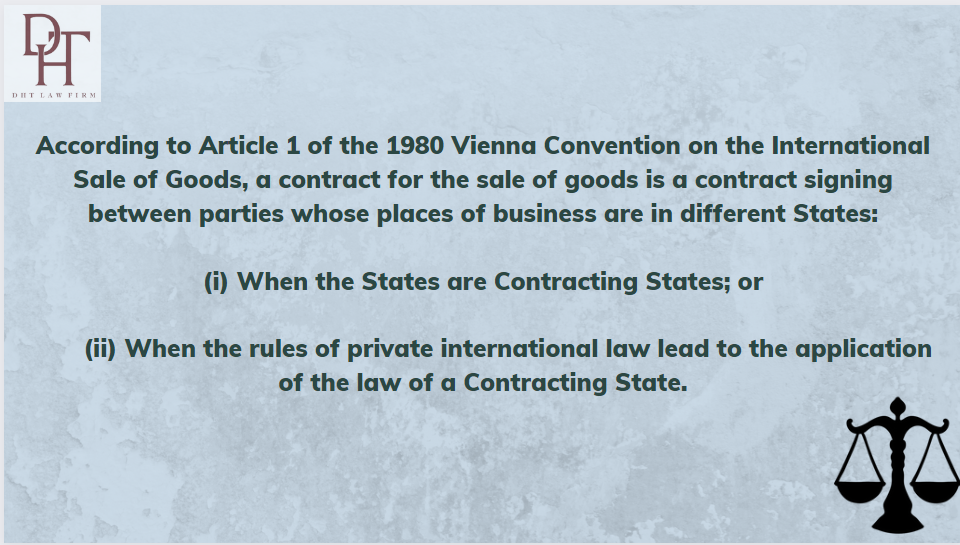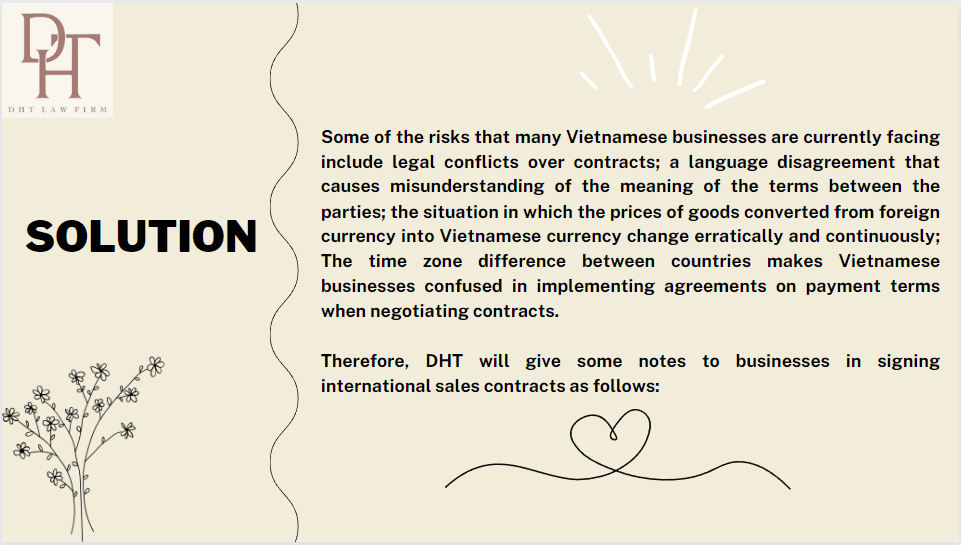
VIENNA CONVENTION 1980 AND SOME NOTES FOR BUSINESSES WHEN SIGNING INTERNATIONAL SALES OF GOODS CONTRACTS

The United Nations Convention on contracts for the International Sale of Goods (referred to “CISG”) was adopted in 1980. Since then, the CISG has contributed greatly to the economic development of its member states, including Vietnam. Specifically, in 2021, the total export and import turnover of goods reached USD 668.5 billion, saw an increase of 22.6% since the previous year, of which exports increased by 19% and imports climbed by 26.5%. However, in fact, this strong development also led to the appearance of a series of disputes arising from the sale of goods contracts. Especially in the process of drafting and signing contracts, many businesses still carelessly use contract templates that do not have accurate content. This leads to serious consequences regarding the validity of the contract. Therefore, DHT will give some notes to businesses in signing international sale contracts.
1. International sale of goods contract
1.1 Definition

1.2 Features
First, the parties (the seller and the buyer) to the international sale of goods contract are traders and businesses, whose commercial headquarters are located in different countries.
Second, on the subject of international sale of goods. According to the 1980 Vienna Convention on Contracts for the International Sale of Goods, goods that are the subject of a company's sale of goods include assets that have two basic properties: (i) could be considered sales and (ii) are of a commercial nature. The 1980 Vienna Convention on Contracts for the Sale of Goods (Article 2) only excludes (not apply) to certain types of goods such as securities, security and circulation money, electricity, etc.
Third, about the format of international sale of goods. Vietnam declares to reserve Article 11 of the 1980 Vienna Convention, contracts being signed must be performed in written form. If there is a formality violation, the Vietnamese Court or the Arbitrator in Vietnam may declare invalid. The best option when entering into a contract for the international sale of goods is to draft the contract in writing because the contents will be clearly defined and convenient for later dispute resolution.
Fourth is about the authority to sign the contract. An individual may enter into contracts for the international sale of goods by himself or legally authorize another individual. However, a corporation cannot perform the signing act on its own, but through its legal representative. In order for the contract to be valid, it is noteworthy to determine whether the individual has the authority to enter into the contract or not.
Another important point is that the authority to sign the arbitration clause is not identical to the authority to sign a contract. In other words, the arbitration clause is independent from the contract, which aims to select a dispute resolution agency. According to Article 19 of the Law on Commercial Arbitration: “An arbitration agreement is entirely independent from the contract. Any modification, extension, cancellation, invalidation or nonperformance of the contract will not invalidate the arbitration agreement.”. Therefore, if the parties agree on arbitration clauses, they should determine whether the contract signatory has the authority or is authorized to sign the arbitration clause or not.
Finally, the law governing contracts for the international sale of goods. The headquarters of the parties are located in different countries. It means that the parties to a contract are governed by different legal systems, which leads to a conflict of law. Conflict of law occurs when two or more legal systems can simultaneously be applied to regulate an important legal system or another legal system. Therefore, contracts for the international sale of goods may be governed by the laws of different countries. In addition, international sale of goods contracts can be governed by international treaty, international commercial practices or pattern statute laws on international commercial contracts. However, it should be emphasized that in a contractual relation, only one legal system can be applied to regulate.
In reality, several international sales of goods contracts are regulated by Incoterms. In addition to the parties having to specify the applicable law, disputes often arise when the parties do not specify the year of Incoterms or write the wrong port name. Adjudication practice shows that arbitration centers usually choose the most recent Incoterms of the year in unspecified cases. In addition, each Incoterms condition associated with the port of destination or port of departure is different, so the contract needs to be written exactly.
2. The current situation of signing international goods sale and purchase contracts of Vietnamese enterprises
Statistics of the International Arbitration Center (VIAC) show that the number of commercial disputes tends to increase over the years, of which more than 50% of services are related to contracts for the sale of goods (50% of which are import and export contracts). Some reasons lead to the above situation is Vietnamese enterprises are still negligent in entering into contracts with their partners. Disputes mainly related to Vietnamese enterprises being defrauded; appropriating deposits, contract advances, and service provision money largely due to not knowing about partners. In addition, Vietnamese enterprises are still subjective in entering into contracts that they often do not meet face-to-face and only transact via email, phone, and fax, so when a dispute occurs, it is impossible to check the authenticity of the address or the financial ability of the counterparty.
Besides, there are situations where Vietnamese businesses are offered attractive prices, convenient payment and delivery and quickly sign contracts and pay in advance without checking carefully about their partner. Also, many Vietnamese businesses still opt for a risky payment method which is prepayment, depositing a fairly high percentage of valuable shipments. In those cases, when there is a problem, only when they can not contact their partner do they realize they have been defrauded.
3. Some notes for Vietnamese businesses in signing international goods sale and purchase contracts.

First, change the mindset in signing and performing contracts. In the era of a dynamic and integrated market economy, before making investment decisions and entering commercial contracts, businesses need to check and clearly define legal capability and enforceable partner cooperation. At the same time, take measures to assess the financial ability and reputation of the partner to enter into the contract. This is also an important condition for the contract to be valid. To do this, businesses need to improve their knowledge of the law to protect their rights when participating in the commercial contract.
Second, comply with the agreement and provisions of the law on commercial contracts. The most important element of a contract is the consent, the unified will of the parties. The establishment of a contractual relationship must not be coercive, deceptive, or contrary to the provisions of the law. The agreement or compliance with the law of the contract will minimize the invalidity of the contract or the contract has no legal effect on the content or the contract form.
A commercial contract signed by a representative without the authority to verify can also make the contract invalid or the law rules that such a contract is in writing, but if the parties choose to establish the form of a verbal contract, the agreement is invalid and this contract will be considered invalid.
Third, the ability to control actions when enforcing the terms as well as the entire contract. The signed contract is an important economic and legal basis for contract performance. Contract performance may be applied in different ways as deemed appropriate and mutually agreed upon by the parties. The execution can be done once (single stage) or multiple times (multi-stage). The guarantee of the partner's ability to perform the contract can be applied by different measures, such as deposit measures, escrow, etc.
Finally, orienting specialization and professionalism in contract signing and performance. This measure can be applied in many different ways. But there are two possible possibilities: hire a lawyer to represent the company to sign, perform the contract and resolve arising disputes; others who have the lawyer's authority. However, not every lawyer is also a good one, so it is necessary to choose the right lawyer to ensure trust and high expertise in the field of contract. Thus, whether hiring a lawyer or a legal representative to sign the contract, it still orients professional in commercial activities. This may also be one of the new directions, but it is a safe and effective solution for Vietnamese businesses, especially those in the start-up stage.
4. Conclusion
The above is the overview on some legal issues related to international sales of goods contracts. Accordingly, we offer our clients some solutions to help reduce risks in signing international contracts for the sale of goods. Dai Ha Thanh Law Firm with a team of professionally trained lawyers, legal advisors at home and abroad is committed to providing professional legal services to our clients. If customers need detailed advice, please contact us to receive professional and effective legal consulting services.

